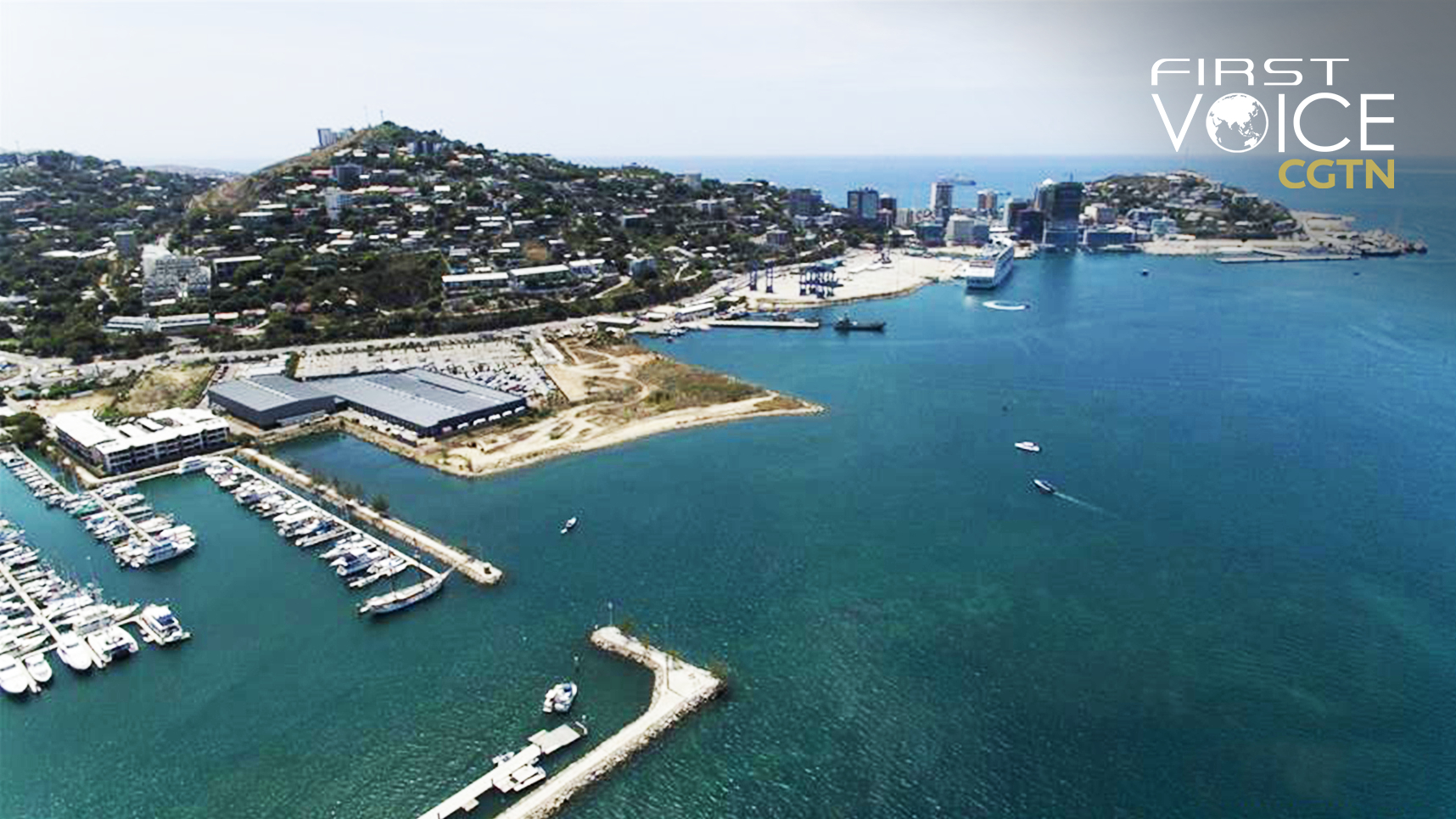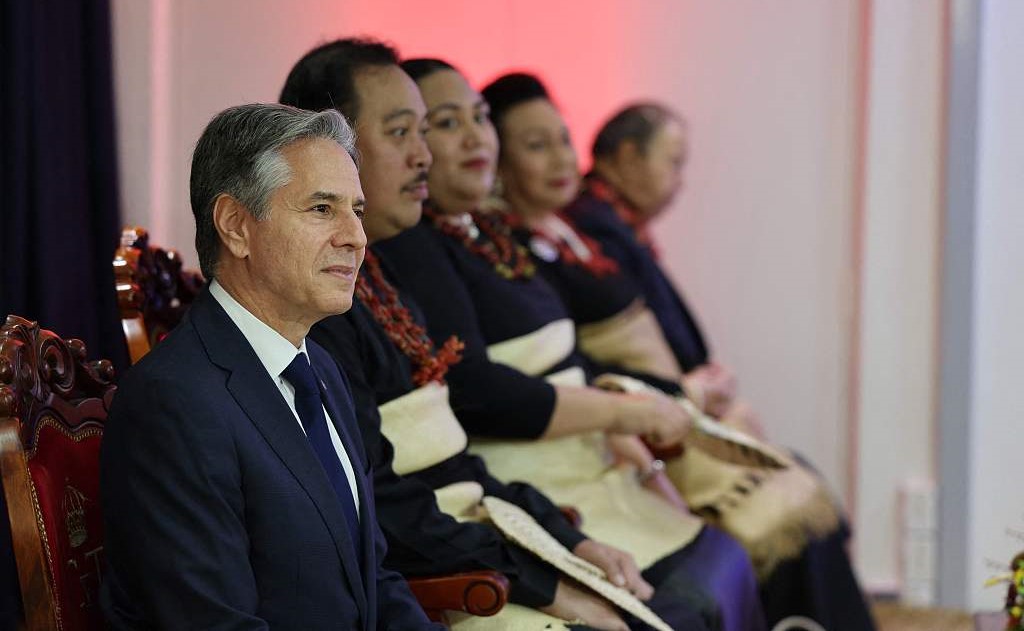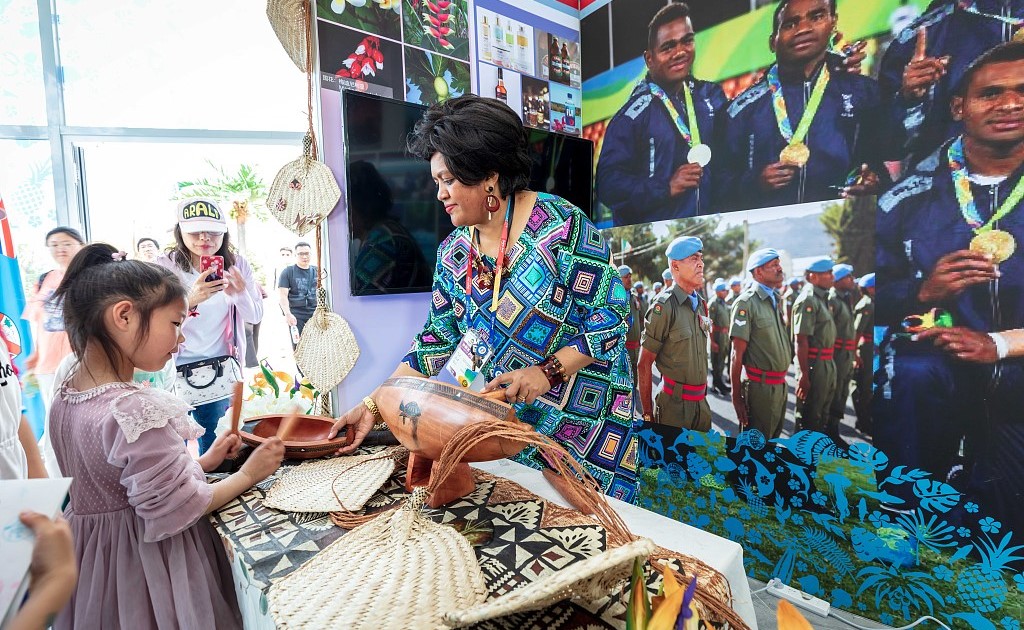
Editor's note: CGTN's First Voice provides instant commentary on breaking stories. The column clarifies emerging issues and better defines the news agenda, offering a Chinese perspective on the latest global events.
We could barely see the top diplomat and the top defense official of the U.S. visit different Pacific Island countries at the same time, but it indeed happened when Anthony Blinken and Lloyd Austin paid a visit to Tonga and Papua New Guinea respectively on July 26. Austin has also become the first U.S. Secretary of Defense to visit the island country.
Also unusual was Washington's behavior in the region over the past two years given that Pacific Island countries were invited to join the mechanism "the Partners in the Blue Pacific," launched by the U.S. and four of its allies, namely the UK, Japan, Australia, and New Zealand in June 2022. Only three months later, President Joe Biden hosted the first-ever U.S.–Pacific Island Country Summit, joined by up to 12 leaders from the Pacific, with an $810 million investment plan announced by the U.S. president in his first-ever Pacific Partnership Strategy unveiled at the end of the summit on September 29.
This year has witnessed further moves by the U.S., which opened embassies in the Solomon Islands and Tonga in February and May. Subsequently, a massive increase in diplomatic personnel and spending for facilities at new U.S. embassies in the Pacific Islands was announced in mid-July.
Beijing is a main target of "Washington's diplomatic activism" in the Pacific, which has become "a focal point of geopolitical competition," said CGTN special commentator Imran Khalid. Because China and the Pacific Islands deepened their cooperation in recent years, which indicated the "expansion of China's influence," this has worried the U.S. so much that they are also trying to woo the Pacific nations, especially after China and the Solomon Islands signed a security agreement in 2022.
"Even the tiniest countries" has become an arena where "fearful Beijing is outcompeting the U.S.," The Washington Post commented bluntly. Hence, there is a "growing sense of urgency in the U.S. that closer alliances need to be forged quickly," said The Wall Street Journal in an article on Blinken's Tonga trip.

U.S. Secretary of State Antony Blinken, Tonga's Crown Prince Tupouto'a 'Ulukalala (2nd-L) and Crown Princess Sinaitakala (3rd-L) attend the dedication of the new U.S. embassy in Tonga, July 26, 2023. /CFP
U.S. Secretary of State Antony Blinken, Tonga's Crown Prince Tupouto'a 'Ulukalala (2nd-L) and Crown Princess Sinaitakala (3rd-L) attend the dedication of the new U.S. embassy in Tonga, July 26, 2023. /CFP
It remains to be seen whether Washington will succeed although they have made "unprecedented" efforts to win over the Pacific Islands. Tongan Prime Minister Siaosi Sovaleni told Blinken on July 26 that he wasn't concerned about the large amount of money that his country borrowed from China, with their bilateral relations developing around infrastructure construction and other development projects. Sovaleni's response embarrassed the visiting U.S. Secretary of State, who had just criticized China for their "increasingly problematic behavior" such as "predatory" aid and investment with strings attached.
In early 2022, when people in Tonga suffered from tsunamis triggered by a volcanic eruption, China extended a helping hand, providing the fastest and largest batches of assistance. "China sincerely helps the Pacific Islands improve their independent development capabilities, and promote the economic growth and people's livelihood, which demonstrates the responsibility of a big country with the world in mind," said a former Tongan Ambassador to China and Tonga-China Friendship Association Secretary-General Ciamelier Ratu.
With an average annual growth rate of 13 percent, the total trade volume between China and the Pacific Island nations with diplomatic relations increased from $153 million to $5.3 billion between 1992 and 2021, with China's direct investment there reaching $2.72 billion at the end of 2021.

The booth of the Pacific Islands at the International Horticultural Expo 2019 in Beijing, capital of China, May 3, 2019. /CFP
The booth of the Pacific Islands at the International Horticultural Expo 2019 in Beijing, capital of China, May 3, 2019. /CFP
The U.S. might be inspired more by "utilitarian concerns" than a "genuine desire to help" South Pacific nations when they showed a "renewed interest" in forging ties with the region, Imran Khalid claimed. The Pacific could become a tool to counter China, which won't necessarily lead to stability and prosperity of the region itself.
Historically, the Pacific Islands were colonized by Europeans. To this day, the U.S. still grapples with unresolved issues in the region, such as the nuclear legacy in the northwest of the Marshall Islands, where the U.S. conducted more than 60 nuclear tests from 1946 to 1958, which left huge trauma to locals with thousands suffering from radiation and cancer, and some still coping with various sequelae today. The environment has also been irreversibly damaged.
However, neither has the U.S. issued a formal apology to the victims, nor has it fulfilled its promise of compensation. The U.S. always promises the moon, but if the increasing promises aren't fulfilled as expected, they may no longer be attractive.
Sincerity is a key to success when a nation wants to keep good relations with others. As the U.S. came back to the Pacific Islands, they are expected to bring stability and growth there, rather than treating the region as their "backyard," or a pawn in pursuit of geopolitical interests.
(If you want to contribute and have specific expertise, please contact us at opinions@cgtn.com. Follow @thouse_opinions on Twitter to discover the latest commentaries in the CGTN Opinion Section.)